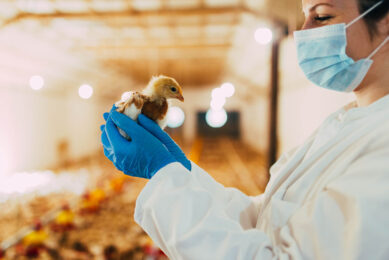Research: Emerging zoonosis threats in poultry production
The use of antibacterial drugs in animal production leads to emergence of drug resistant bacteria in food producing animals. In recent years, Escherichia coli and Salmonella bacteria, which produce extended-spectrum ß-lactamase (ESBL) or are resistant to fluoroquinolones, have been found in poultry meat produced in some EU countries and elsewhere in the world.
Resistance based on ESBL production has quickly become more common in human E. coli infections also in Finland. The ESBL and fluoroquinolone resistance of bacteria present in poultry is believed to be linked with the use fluoroquinolones in animal production. In Finland fluoroquinolones and cephalosporins are not used at all in the medication of poultry. The use of other antibiotics is also extremely limited due to the good disease status.
Some of the E. coli strains pathogenic to poultry, dogs and humans are completely identical. These bacteria cause extraintestinal infections. In humans the most common of these is urinary tract infection and the most dangerous infections include sepsis and neonatal meningitis.
E. coli bacteria trigger various inflammatory diseases in poultry, resulting in considerable production losses and deterioration in the well-being of the birds.
ESBL and fluoroquinolone resistance as well as E. coli bacteria causing generalized infections can be transmitted from animals to people. Thus, they constitute a zoonosis threat. The susceptibility of humans to E. coli infections increases as the population grows older and the proportion of diabetic patients increases.
E. coli bacteria with properties suggesting they could be pathogenic also to humans have been found in Finnish meat poultry flocks. However, the antibiotic resistance status of poultry production is excellent in Finland compared with other countries; this gives Finland an advantage as a producer of safe food, reports the Finnish Food Safety Authority.
In order to secure this advantage, a research project is about to be launched to gather information about the prevalence of these infections and resistance factors in animals and people in Finland. The development of methodology for the prevention of E. coli infections in poultry and for the reduction of contamination at slaughter is another focal area of the project.
The Ministry of Agriculture and Forestry has granted funding for the project Atypical, emerging zoonoses in animal production for 2010-2012. The research project is carried out in collaboration between Finnish Food Safety Authority Evira, the National Institute for Health and Welfare THL, the Ruralia Institute at the University of Helsinki, HK-Ruokatalo Oy and Freie Universität Berlin, Germany.
Source: Finnish Food Safety Authority













